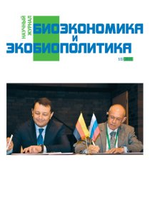Utilization of Natural Raw Materials for the Fermentative Production of Fine Chemicals Especially Natural Aroma Chemicals
Автор: Rabenhorst J.
Рубрика: Тезисы
Опубликовано в Биоэкономика и экобиополитика №1 (1) декабрь 2015 г.
Дата публикации: 15.01.2016
Статья просмотрена: 2 раза
Библиографическое описание:
Rabenhorst, J. Utilization of Natural Raw Materials for the Fermentative Production of Fine Chemicals Especially Natural Aroma Chemicals / J Rabenhorst. — Текст : непосредственный // Биоэкономика и экобиополитика. — 2015. — № 1 (1). — URL: https://moluch.ru/th/7/archive/20/669/ (дата обращения: 18.04.2024).
After a short introduction of our university some examples of processes developed by the author in the past will be presented.
1) The fermentative production of vanillin, the most important flavouring substance, from ferulic acid. Ferulic acid is an abundant phenolic phytochemical found in plant cell wall components such as arabinoxylans as covalent side chains and as a monomer of lignin. In a fed-batch fermentation process, an Amycolatopsis sp.
is able to convert ferulic acid in high yields into vanillin. Within 32 hours 11.5 g L-1 vanillin can be obtained.
2) The production of short chain carboxylic acids, like Butyric acid, Propionic acid, Isobutyric acid, 2Methylbutyric acid, Isovaleric acid by oxidation of the corresponding alcohols with Gluconobacter sp..These carboxylic acids are important flavour compounds when applied in trace amounts for flavouring of different types of foods. In this biotransformation process high product concentration in the range of over 80 – 90 g L-1 within three to four days.
3) The microbial production of Guaiacol and 4-Vinylguaiacol by Bacillus sp. is an actual project. Both substances are important smoke-flavours. We have obtained product concentrations of more than 6 g L-1 within less than a day.
Interest for cooperation is in the area of utilization of natural raw materials for the production of fine chemicals, especially natural aroma chemicals. This includes the valorisation of waste materials of food processing as a substrate. These can include oily, fatty or waxy materials, which should be modified by bacterial, yeast and mould cultures.







